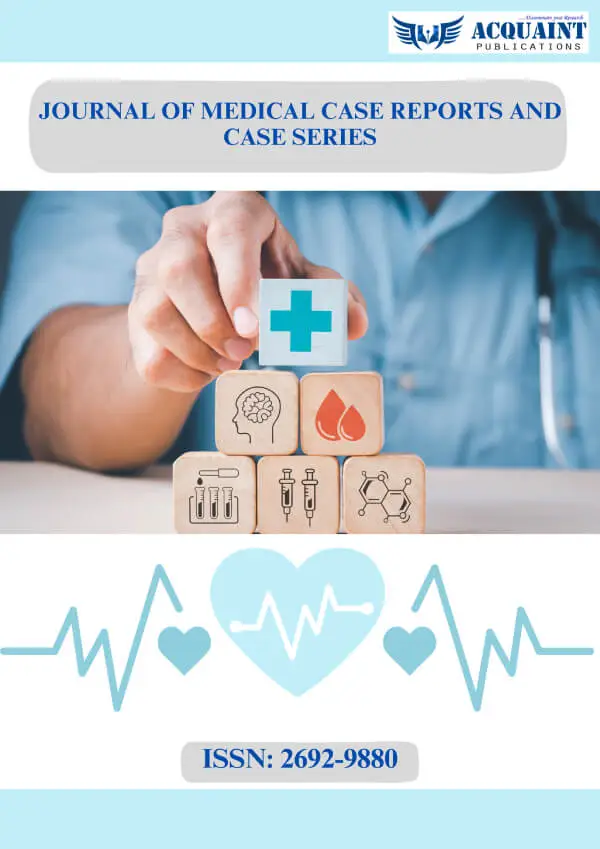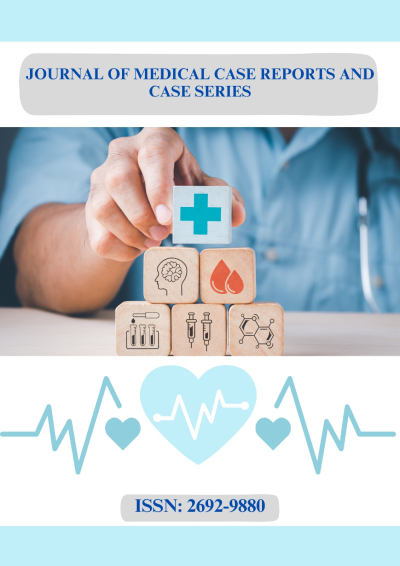Souranshu Chatterjee, Teena Wadhwa*, Sonam Singla, Vyoma Singh, Smita Sarma
Department of Clinical Microbiology and Infection Control, Medanta-The Medicity, Gurgaon, India.
*Corresponding Author: Teena Wadhwa, Department of Clinical Microbiology and Infection Control, Medanta-The Medicity, Gurgaon, India.
Abstract
SARS-CoV-2 neutralizing antibodies against the spike protein receptor-binding domain may provide some post-infection immunity. In our hospital, four HCWs (Health Care Worker) were found to have antibodies to SARS-CoV-2 without COVID-19 infection, of which two of them presented with the infection later, probably due to decreasing antibody titre and high risk of exposure. Presently we cannot say for sure whether past seroconversion or current antibody levels determine protection from infection, or which characteristics are associated with re-infection. However, we believe our observation corroborates with current knowledge about the issue and may add value to future cases with similar clinical presentations.
Keywords: COVID-19, HCW (Health Care Worker), SARS-CoV-2 IgG (anti-spike) antibody
Introduction
SARS-CoV-2 (severe acute respiratory syndrome-Coronavirus-2), the etiologic agent of COVID-19 (Corona Virus Disease-2019) was declared a global pandemic by the World Health Organization (WHO). Since its discovery, SARS-CoV-2 has spread all over the world, causing significant mortality. Though it is believed that patients recovering from COVID-19 infection carry protective antibodies against SARS-CoV-2, many cases of recurrences have been reported. We need further data to determine risk factors that can cause re-infection. Recurrence may be related to host factors (co- morbidities, virologic status etc) or characteristics of the virus. It is important to study further to know if the cases of suspected recurrence are caused by incomplete clearance of the virus from the initial infection, or if recovered people are re-infected. [1] Reports also indicate the re-infection with genetically distinct SARS-CoV-2 virus due to emerging mutations. [2] Here, we present a case series of four HCWs (Health Care Worker) in our institute who initially had antibodies to SARS-CoV-2 without documented infection with SARS-CoV-2, but two of them presented with the infection later. We would like to discuss these cases in the context of antibodies in providing immunity against SARS-CoV-2 infection.
Case Presentation
A random serological prevalence survey of HCWs was carried out in June-2020 by doing SARS-CoV-2 IgG (anti-spike) antibody by chemiluminescent immunoassay (CLIA) on a Liaison DiaSorin XL instrument (DiaSorin Inc., Saluggia, Italy). During the survey, 99 HCWs were screened, of which four HCWs staff were detected positive for SARS-CoV-2 IgG. Among them, two were ICNs (Infection Control Nurse) while the other two were administrative staff and paramedical staff respectively. Among the ICNs, one was male and the other was female. The other two staffs were females. The respective antibody titres for the four positive staffs (ICN-1, ICN- 2, Administrative staff and Paramedical staff) at the time of screening were 43 AU/ml, 54 AU/ml, 43.5 AU/ml and 34.1 AU/ml respectively. All four HCW were asymptomatic at that point in time and there was no previous history of any symptoms suggestive of Covid -19 infection in the preceding two months. These four HCWs were followed up. In October-2020, it was observed that the male ICN developed symptoms of fever and diarrhoea. He was tested for SARS- CoV-2 RT-PCR, the result of which was positive. There was no history of cough, breathlessness, body ache or any other symptoms related to COVID-19. His antibodies were also checked at that time and the value was 22 AU/ml which was less than that in June-2020 (43 AU/ml) when follow-up had begun. He was advised seventeen days of government-mandated home isolation and he recovered after a mild course of illness. The second ICN-2 (female) developed symptoms of fever and diarrhoea followed by respiratory symptoms of cough, body ache and breathlessness in January 2021 and her RT- PCR result came positive. Her antibody titre at this time was 24 AU/ml, thus showing a declining trend compared to the previous titre (54 AU/ml). She had also been prescribed medications and was advised seventeen days of home isolation.
The other two staffs, i.e., administrative staff and paramedical staff did not develop any symptoms suggestive of Covid-19 infection till the time the vaccination drive was started in Jan 2021.
Table-1: Risk factors for acquiring COVID-19 infection of all four HCWs were assessed, and they were followed up for a period of nine months. Comparative analysis of the four staff is detailed below (Table-1).
|
Sl. No: |
HCW category: |
ICN-1 |
ICN-2 |
Administrative Staff |
Paramedical Staff |
|
1 |
Age (Years) |
23 |
40 |
32 |
60 |
|
2 |
Sex (Male/ Female) |
Male |
Female |
Female |
Female |
|
3 |
Area where working |
ICN |
ICN |
Front office |
Nuclear Medicine |
|
4 |
History of exposure to confirmed COVID-19 case |
Yes |
Yes |
Status unknown |
Status unknown |
|
5 |
Type of exposure (Continuous/ Intermittent) |
Continuous |
Continuous |
Intermittent |
Intermittent |
|
6 |
Associated Co-Morbidity (BP / DM / other) |
No |
Hypothyroidism |
No |
No |
|
7 |
History of any immunosuppressive treatment/steroids |
No |
No |
No |
No |
|
8 |
Date of SARS-CoV-2 RT-PCR positive result |
29/10/20 |
27/01/21 |
Not Applicable |
Not Applicable |
|
9. |
COVID Antibody titre at the time of screening (AU/ml) |
43 |
54 |
43.5 |
34.1 |
In addition, Dengue IgG (ELISA) & IgG antibodies against Salmonella (Rapid Immunochromatographic method) was done to rule out any cross-reactivity of SARS-CoV-2 IgG with these. Both Dengue & Typhoid IgG antibodies were negative in all 4 HCWs.
Outcome and Follow-Up:
We did a follow-up of these four HCWs for a period of nine months. Among them, the two ICNs who contracted COVID-19 infection recovered after a mild course of disease with symptomatic treatment. Both joined at the end of the quarantine to their respective duties. The other two HCWs, i.e., administrative staff and paramedical staff continued to remain SARS-CoV-2 PCR negative till the end of the study period.
Discussion
In our study wherein the four staff members were followed for up to nine months, though all four HCWs were positive for SARS-CoV-2 IgG anti-spike antibody, the two ICNs (Infection Control Nurses) developed the infection while the other two staffs (administrative staff and paramedical staff) did not get the infection in the follow-up period. The two staffs who developed the COVID-19 infection had declining SARS-CoV-2 IgG anti-spike antibody titres during the follow-up period. This could be a probable factor in acquiring the infection as has been observed in the study conducted by Lumley et al [3] wherein it was found that the presence of anti-spike or anti- nucleocapsid IgG antibodies was associated with a substantially reduced risk of SARS-CoV-2 re-infection in the ensuing 6 months, but the incidence of SARS-CoV-2 infection was found to be inversely associated with baseline anti-spike and anti-nucleocapsid antibody titres.
Both ICNs who became COVID-19 positive were immuno- competent, however as both were working in ICU (Intensive car Unit) for COVID-19 patients, they had continuous exposure and thus were at had a high risk of acquiring COVID-19 infection. This is similar to a study by Brehm TT et al. [4] in which a SARS-CoV-2 re- infection case was reported in a highly exposed immuno-competent female HCW, seven months after her initial infection. It was concluded that SARS-CoV-2 re-infection of such an immuno- competent patient in a high-risk healthcare setting indicated that a moderate immune response after the first infection, rather than viral escape allowed the re-infection.
In our study, the two ICNs who came positive for SARS-CoV-2 RT- PCR, their antibodies were in a declining trend. The findings indicate that decreasing antibody titre and high risk of exposure may pose a risk to acquire COVID-19 infection possibly due to waning of the immune response.
We presume the presence of antibodies in all four healthcare workers due to subclinical exposure to patients, particularly in the two ICNs. It could be due to colonization of the respiratory tract without any clinical manifestations, thus there was no documented Covid -19 infection. Also, a strong immune system (as all were immunocompetent and there was no history of use of any immunosuppressive drugs/ steroids) could have prevented the development of symptoms in them. However, the decreasing antibody levels and continuous exposure in the two ICNs made them more prone to acquiring the infection. Though ICN-2 had higher baseline antibody titres as compared to the other three HCWs, she contracted the infection after seven months of the initial antibody-positive titre. This has also been mentioned in a study by Lumley et al. [3] wherein they have documented the protection with antibodies to most people till six months.
We cannot say clearly whether the two ICNs who came positive had a re-infection or reactivation as there was no initial documented Covid-19 infection, but our study indicates that falling titres of antibody and continuous high-risk exposure are strong risk factors for acquiring the infection. It is thus important to study the trend of the levels of antibodies with the passage of time, more significant at this time when vaccination is being provided to the community. Hence more studies are required to explore the data and form a framework for the vaccination strategy, also for the booster dose recommendations.
Understanding immune status, be it due to post-infection or post-vaccination, and how long it lasts, has a significant role in determining the prognosis of the patients, and whether it gives protection or reduces the severity of symptoms needs to be followed up. The relationship between the presence of antibodies to SARS- CoV-2 and the risk of subsequent re-infection is not clear yet. Though SARS-CoV-2 infection produces detectable immune responses in most cases reported, the extent to which previously infected people are protected from a re-infection is uncertain.
However, a limitation of our study was our inability to determine neutralizing antibodies. In the study by To KK et al in Hong Kong, authors had mentioned that neutralizing antibodies against the spike protein receptor-binding domain may provide some post-infection immunity and as antibody titre decreases over time, an increasing proportion of COVID-19 patients would become susceptible to re- infection. [5]
Learning Points / Take Home Messages:
- Despite the presence of protective antibodies (post-infection / vaccination), the predisposition to contract the COVID-19 infection persists.
- The recommended precautions for COVID-19, such as wearing of masks, hand-hygiene and social distancing should always be encouraged and followed even after having protective antibody titres.
- Once further data regarding the declining trend for SARS-CoV-2 antibodies becomes available, the necessity to schedule booster dose regimen can be considered
References
- Gidari A, Nofri M, Saccarelli L, Bastianelli S, Sabbatini S, et al. (2021) Is recurrence possible in coronavirus disease 2019 (COVID-19)? Case series and systematic review of literature. Eur J Clin Microbiol Infect Dis. 40(1): 1-12.
- AlFehaidi A, Ahmad SA, Hamed E (2021) SARS-CoV-2 re- infection: a case report from Qatar. J Infect. 82(3): 414-451.
- Lumley SF, O'Donnell D, Stoesser NE, Matthews PC, Howarth A, et al. (2021) Antibody Status and Incidence of SARS-CoV-2 Infection in Health Care Workers. N Engl J Med. 384(6): 533- 540.
- Brehm TT, Pfefferle S, von Possel R, Kobbe R, Nörz D, et al. (2021) SARS-CoV-2 Reinfection in a Healthcare Worker Despite the Presence of Detectable Neutralizing Antibodies. Viruses. 13(4): 661.
- To KK, Hung IF, Chan KH, Yuan S, To WK, et al. (2021) Serum Antibody Profile of a Patient with Coronavirus Disease 2019 Reinfection. Clin Infect Dis. 72(10): e659-e662.



